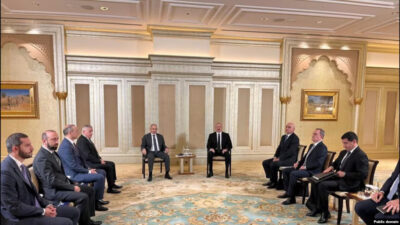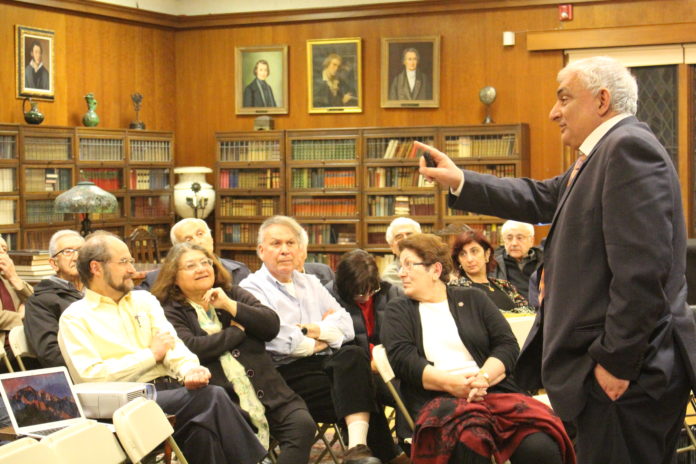CAMBRIDGE, Mass. — On April 17, the Cambridge-Yerevan Sister City Association (CYSCA) held its annual program for the Cambridge Science Festival, showcasing its special guest, internationally-famous Professor Ashot Chilingarian from Yerevan.
Chilingarian heads the Yerevan Physics Institute and its world-renowned Cosmic Ray Division, directing the International Research Center for High Energy Astrophysics, Space Weather and Atmospheric Space Weather. The main event was a panel discussion organized by CYSCA, and co-sponsored by the National Association for Armenian Studies and Research (NAASR) and the Massachusetts Institute of Technology (MIT) Armenian Society.
A panel of six local experts joined Professor Chilingarian to discuss “New Perspectives: Lightning, Climate Change and Other Exciting Scientific Challenges.” There were about 100 participants, with more than 50 percent of those attending college age.
Mike Wankum, chief meteorologist at WCVB, moderated the panel discussion with creative, lively comments.
Chilingarian began his presentation explaining that at the Aragats Cosmic Ray Research Center, 3,200 meters above sea level, they measure secondary cosmic rays, products of particle interactions with terrestrial atmosphere. He explained that thunderclouds are full of water and radiation and that water vapor is the fuel for thunderstorms. He said lightning will strike far more frequently in a world under climate change. Also, the increase of lightning flashes would lead to a higher number of wildfires. He added that the location of the center is high up in the mountains in order to get more particles from clouds which are located directly on the stations.
Dr. Areg Danagoulian, assistant professor of nuclear science and engineering at MIT, talked about nuclear security and elaborated on the danger of nuclear weapons. The first test of nuclear weapons in New Mexico changed the world and began an arms race. In addition, he talked about the Nuclear “Triad” submarines where one submarine has 24 missiles and one submarine missile has 6 million tons of TNT equivalent. He also noted that explosives used in all of WWII wer only 3 million tons and that the US, UK and Russia have 20 nuclera submarines. There are problems: 1) too many weapons, thus an unstable balance could cause accidental nuclear war; 2) loose nukes, loose materials, thefts, proliferation, nuclear terrorism. What to do? First, ambitious arms reduction treaties and need technologies for security to verify the treaties. Second, he added, it is necessary to develop systems for weapon authentication, physical cryptography and the fingerprint of a weapon. Danagoulian favored the use of nuclear power for peaceful use. He also explained the pros of nuclear power reactors for clean power with no carbon dioxide as well as the possibility for energy independence. He said the cons would be to spend money on fuel storage, allaying the fear of radiation as well as proliferation risks. He also noted that in Armenia, nuclear power provides 40 percent of the country’s energy.








